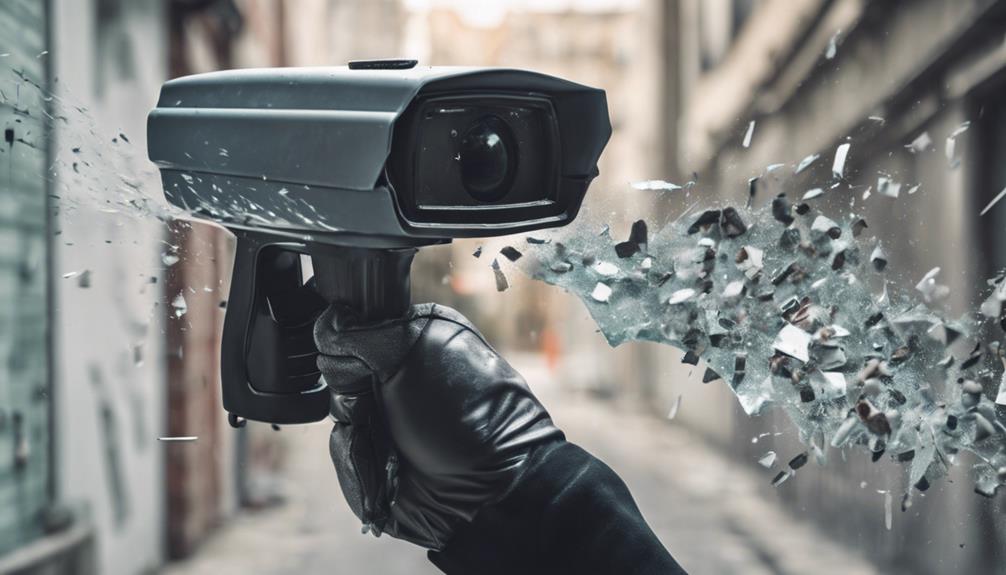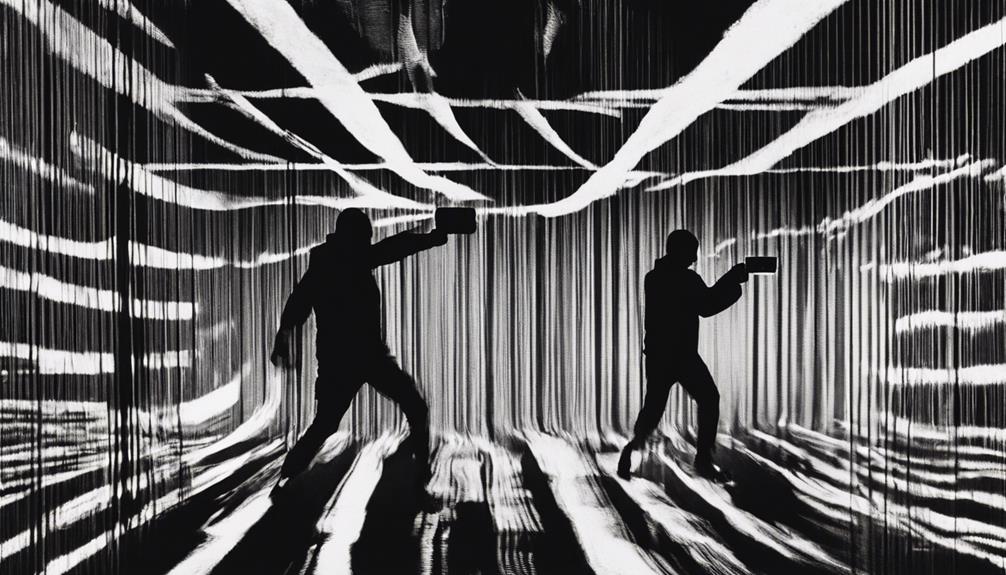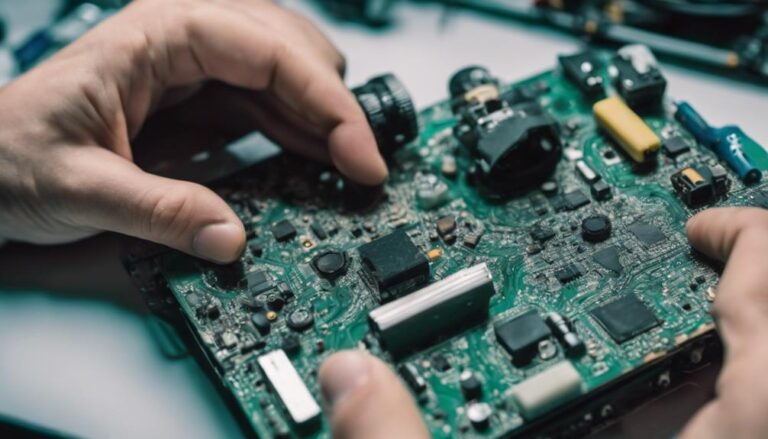If you need to destroy a security camera, understand that there are several methods, each with distinct risks and consequences. Physically striking the camera with a hammer is effective, but it's highly detectable. Alternatively, using paint or covering it with duct tape offers more subtlety but less effectiveness. Disabling power sources can effectively render wired cameras useless, while signal jammers can interfere with wireless devices. However, remember that all these actions may carry serious legal ramifications. Before proceeding, consider the deeper ethical implications and alternatives available, which might provide a more prudent approach to your concerns.
Understanding Security Camera Types

When it comes to understanding security camera types, you'll find a variety of options, each designed for specific purposes. The two primary categories are analog cameras and digital cameras. Analog cameras transmit video signals over coaxial cables, making them a reliable choice for wired systems. On the other hand, digital cameras, often associated with IP technology, offer higher resolution and can be integrated into wireless systems, providing flexibility in installation.
For indoor surveillance, compact models with features like motion detection are ideal, allowing you to monitor specific areas without excessive coverage. Conversely, outdoor surveillance cameras need to withstand environmental conditions; they often come equipped with night vision capabilities to guarantee visibility in low-light situations.
When considering your setup, think about the balance between wired and wireless systems. Wired systems usually offer better reliability, while wireless systems provide ease of installation and flexibility. Ultimately, understanding these distinctions helps you make informed decisions about which cameras will best suit your needs, whether you prioritize the convenience of digital options or the tried-and-true reliability of analog systems.
Legal Consequences of Tampering
Tampering with security cameras can lead to serious legal repercussions that vary by jurisdiction. You might think that disabling or damaging these devices is a minor offense, but the reality is quite different. The legal ramifications can be severe, often involving significant fines and potential criminal charges. Understanding these consequences is vital if you value your freedom.
Here are three key points to take into account:
- Vandalism Charges: Tampering with security cameras can be classified as vandalism, which may result in misdemeanor or felony charges depending on the extent of the damage.
- Privacy Violations: Interfering with surveillance can lead to accusations of privacy invasion, particularly if the cameras were installed in areas where individuals have a reasonable expectation of privacy.
- Civil Liability: Beyond criminal charges, you could also face civil lawsuits from property owners or businesses for damages incurred due to your actions.
Physical Methods of Destruction

There are numerous physical methods to destroy a security camera, each with varying degrees of effectiveness and risk. Understanding camera vulnerabilities can help you choose the best approach based on your situation. Utilizing tampering tools can make the process more efficient, but it is vital to weigh the consequences.
Here's a table illustrating some physical methods you might consider:
| Method | Effectiveness & Risk |
|---|---|
| Hammer Strike | High effectiveness, high risk of detection |
| Paint or Spray | Moderate effectiveness, low risk of detection |
| Duct Tape or Cloth | Low effectiveness, very low risk |
| Laser Pointer | Moderate effectiveness, potential for detection |
| Fire or Heat | High effectiveness, very high risk of detection |
Each method has its advantages and disadvantages. For instance, a hammer strike may effectively destroy the camera but could attract attention, while using paint might obscure the lens with less immediate risk. Always assess the environment and the potential for surveillance before proceeding. Remember, while seeking freedom, understanding your actions' implications is vital.
Disabling Power Sources
Disabling power sources can be a strategic approach to rendering a security camera inoperable. By cutting off its energy supply, you can effectively neutralize its surveillance capabilities. Here are three methods to take into account:
- Battery Removal: If the camera is battery-operated, locate and remove the batteries. This is often the simplest method and guarantees the camera can't function immediately.
- Power Interruption: For wired cameras, identify the power source and disconnect it. This could involve unplugging the camera from its outlet or severing the power cable. Be cautious, as this may require tools or specific techniques to avoid detection.
- Circuit Shutdown: Another option is to disable the circuit breaker connected to the camera. Locate the relevant breaker in the electrical panel and switch it off. This method can impact multiple devices, so use it judiciously.
While these methods can disable a security camera, it's essential to take into account the legal and ethical implications of your actions. Always prioritize your safety and freedom within the boundaries of the law.
Interfering With Signal Transmission

After disabling the power sources, another effective strategy involves interfering with the signal transmission of security cameras. This method can be executed using signal jammers, which are devices designed to disrupt communication by emitting signals on the same frequency as the camera. When you deploy a signal jammer within the operational range of the camera, it creates frequency interference that can effectively block the transmission of video data to the recording device.
To implement this strategy, you'll need to identify the frequency used by the specific security camera. Most cameras operate on common wireless frequencies such as 2.4 GHz or 5 GHz. Once you've pinpointed the frequency, you can select a suitable signal jammer that operates on that band.
Keep in mind that while this approach can temporarily disable the camera's ability to transmit footage, it may not affect its recording capabilities if it has onboard storage. Thus, understanding the limitations of this method is essential. Additionally, consider the legal implications of using signal jammers, as they can be illegal in many jurisdictions. Interfering with signal transmission should only be done with careful consideration of these factors.
Ethical Considerations and Alternatives
Ethics play an essential role in discussions surrounding the destruction of security cameras. While the urge to dismantle these devices might stem from concerns over privacy rights, it's vital to contemplate the broader implications of such actions. Engaging in destructive behavior could lead to legal consequences and undermine the very freedoms you seek to protect. Instead, it's worth exploring alternatives that respect both your privacy and ethical surveillance principles.
Here are three alternatives you might contemplate:
- Advocate for Policy Changes: Engage with local legislators to promote laws that better protect privacy rights and regulate the use of surveillance technology.
- Use Privacy-Enhancing Tools: Employ technologies like signal jammers or privacy screens that can help maintain your privacy without resorting to destruction.
- Raise Awareness: Educate your community about the potential drawbacks of surveillance cameras and encourage discussions about ethical surveillance practices.
Frequently Asked Questions
What Tools Are Most Effective for Disabling Security Cameras?
When considering disabling methods for security cameras, it's vital to evaluate the legal implications. Tools can vary in effectiveness, but understanding the laws regarding surveillance is essential to avoid potential consequences and protect your freedom.
Can Security Cameras Be Repaired After Tampering?
Yes, security cameras can often be repaired after tampering, though the success depends on the extent of damage. Employing specific repair techniques is essential, but remember, tampering consequences might lead to legal repercussions you should consider.
How Can I Tell if a Camera Is Recording?
You'll often notice subtle camera indicators, like a blinking red light or a steady green glow. These recording signals reveal if the camera's actively capturing footage, ensuring your awareness of potential surveillance in your surroundings.
Are There Specific Security Cameras That Are Easier to Destroy?
When evaluating camera vulnerabilities, certain models are indeed easy targets. Older, less sophisticated cameras often lack robust features, making them more susceptible to tampering. Research specific brands to identify which ones might be less secure.
What Are Common Mistakes People Make When Attempting to Disable Cameras?
When attempting to disable cameras, a common mistake's underestimating legal consequences. For instance, someone might think removing wires is harmless, but it can lead to legal repercussions and ethical considerations that compromise personal freedom.



